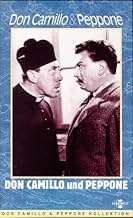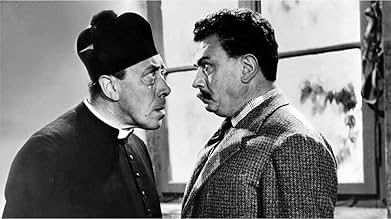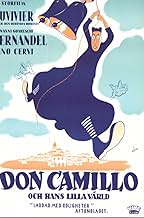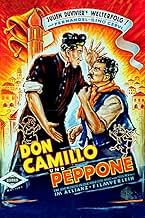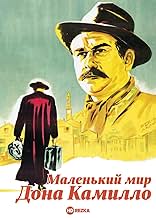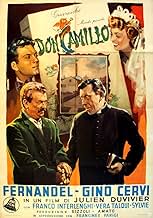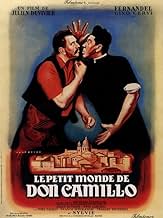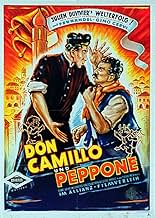IMDb RATING
7.6/10
5.1K
YOUR RATING
A determined priest and a Communist mayor develop a grudging friendship in spite of their official rivalry.A determined priest and a Communist mayor develop a grudging friendship in spite of their official rivalry.A determined priest and a Communist mayor develop a grudging friendship in spite of their official rivalry.
- Nominated for 1 BAFTA Award
- 3 wins & 4 nominations total
Vera Talchi
- Gina Filotti
- (as Vera Talqui)
Charles Vissières
- Il Vescovo
- (as Charles Vissiere)
Clara Auteri Pepe
- Woman saying 'Viva Peppone!'
- (as Clara Auteri)
Manuel Gary
- Il delegato
- (as Manoel Gary)
Featured reviews
This movie is so much fun to watch! Tells us the story of Don Camillo, a Roman Catholic priest in a small Italian parish. Life in the village is change forever when Peppone, the communist mayor, is elected. The two are put one against the other. And what follows is a wacky list of situations! What I like most about this movie, it's the simple way it puts things. You can actually believe that this village exists and that what's being told in the movie really happened.
Fernandel is great as Don Camillo, the hot-headed priest. And Gino Cervi shines in the role of Peppone. See this one, you won't regret it. Fun from beginning to end!
Out of 100, I gave it 87. That's good for ***½ out of ****.
Seen at home, in Toronto, on September 1st, 2002.
Fernandel is great as Don Camillo, the hot-headed priest. And Gino Cervi shines in the role of Peppone. See this one, you won't regret it. Fun from beginning to end!
Out of 100, I gave it 87. That's good for ***½ out of ****.
Seen at home, in Toronto, on September 1st, 2002.
In 1948 the Italian journalist and novelist Giovannino Guareschi wrote: Mondo piccolo : Don Camillo (translated in French en 1951 in Le petit monde de Don Camillo).Giovannino Guareschi creates in this book two strong characters: Don Camillo, the priest of Brescella and Giuseppe "Peppone" Bottazzi ,the communist mayor of Brescella.In 1952 French and Italian producers ask the French director Julien Duvivier to direct the "The little world of Don Camillo" with Fernandel and Gino Cervi as main actors.
Julien Duvivier is a French director well know by "Sous le ciel de Paris", "Marie-Octobre" and "The Devil and the Ten commandments".
Fernandel and Gino Cervi don't need any presentation, there were well known actors in their respective countries.
"Don Camillo" is then the story of the rivalry between Don Camillo and Peppone.The two men have fought together in the Italian resistance and now one is the priest of the village and the other one is mayor of the village.We are in the time of the cold war: in Italy there are now two important political parties who dominate the political life in the country and also in this village of the Po Valley.Don Camillo criticizes Peppone and Peppone criticizes Don Camillo.Every one is thinking in the next moves that he can do to annoy the other one,but also, they will help each other in the difficult moments of their lives.I forget to mention an important character of this film ,the narrator who tells quietly and with humour the rivalry betweeen Don Camillo and Peppone.
(Since I originally submitted this review to the IMDb, an English-subtitled DVD of "The Little World of Don Camillo" -- and of its first sequel, "The Return of Don Camillo" -- has become available in the US. However, I still think that a fan might be interested looking at in the old dubbed version, if he or she can find it.)
This film is the first in a series of five shot in the 1950s and 60s based on Giovanni Guareschi's well-loved "Don Camillo" stories. The joint Italian-French productions were made with the involvement of the author himself, who wrote screenplays and Italian dialog for various entries in the series; therefore, most consider them to be the official movie versions of the Don Camillo stories. Guareschi is quoted as warmly approving of the way that stars Fernandel and Gino Cervi brought to life his two famous protagonists, the battling parish priest and Communist mayor of a small village in post-war Italy. Today, more than forty years after the series was completed, the films are still played on European television, dubbed into a variety of languages. Unfortunately, however, they are all but unknown to English-speaking fans (particularly American ones) of Giovanni Guareschi and his wonderful characters.
But this need not be, for "Le Petit Monde de Don Camillo" (1951) does exist in an English-dubbed version. The only one of the five films to get the treatment, it is quite well done (once you get around the fact that it's dubbed in the first place). "King of Dubbers" Robert Rietti (Rietty) takes on the roles of both Don Camillo and Peppone, while none other than Orson Welles provides the voice-over narration and, in that capacity, the voice of Christ which Don Camillo hears in answer to his prayers. The narration is intrusive at times (they got their money's worth out of Welles), but the movie overall is a faithful adaptation and interweaving of some of the more memorable early Don Camillo tales.
As the story opens, we meet hot-tempered Don Camillo complaining to the Lord about the recent election of the town's Communist contingent. The new Mayor, Peppone, is a particular thorn in Camillo's side, as the two have had an on-going rivalry which only escalates after the election. Conflicts abound: Peppone wants to have his son baptized "Lenin," but Don Camillo has other ideas. The priest has been trying for years to scrape together the money for a town recreation center, then suddenly the Communists tap an unorthodox source of funds and build their own "People's Palace." Peppone wants to fly the Red banner at a church procession, and he doesn't take Don Camillo's veto well. Don Camillo invests heart and soul into a soccer match between the church's team and the Party's, and he doesn't understand why the Lord declines to take a side. The Communists call a strike against the local landowners, but Don Camillo is determined to save the neglected farm animals. And somehow, amid all the sometimes humorous, sometimes serious conflict, a Catholic "Juliet" and a Communist "Romeo" have fallen in love. Can priest and mayor lay down their fists and help them?
I should add, for the *very* knowledgeable Don Camillo film fan, that the dubbed version of "Little World" is based on the Italian rather than the French cut of the original movie (director Julien Duvivier and the mostly bilingual cast shot the two versions simultaneously). Thus, certain scenes that appeared in the French release but were excised by the censors in stricter Italy will not be in the English version.
I believe the dubbed version of "The Little World of Don Camillo" is still available in vintage video catalogs (that's where I got my VHS edition in 1998), and it's worth looking for, especially for fans of the warm and whimsical tales on which it is based.
This film is the first in a series of five shot in the 1950s and 60s based on Giovanni Guareschi's well-loved "Don Camillo" stories. The joint Italian-French productions were made with the involvement of the author himself, who wrote screenplays and Italian dialog for various entries in the series; therefore, most consider them to be the official movie versions of the Don Camillo stories. Guareschi is quoted as warmly approving of the way that stars Fernandel and Gino Cervi brought to life his two famous protagonists, the battling parish priest and Communist mayor of a small village in post-war Italy. Today, more than forty years after the series was completed, the films are still played on European television, dubbed into a variety of languages. Unfortunately, however, they are all but unknown to English-speaking fans (particularly American ones) of Giovanni Guareschi and his wonderful characters.
But this need not be, for "Le Petit Monde de Don Camillo" (1951) does exist in an English-dubbed version. The only one of the five films to get the treatment, it is quite well done (once you get around the fact that it's dubbed in the first place). "King of Dubbers" Robert Rietti (Rietty) takes on the roles of both Don Camillo and Peppone, while none other than Orson Welles provides the voice-over narration and, in that capacity, the voice of Christ which Don Camillo hears in answer to his prayers. The narration is intrusive at times (they got their money's worth out of Welles), but the movie overall is a faithful adaptation and interweaving of some of the more memorable early Don Camillo tales.
As the story opens, we meet hot-tempered Don Camillo complaining to the Lord about the recent election of the town's Communist contingent. The new Mayor, Peppone, is a particular thorn in Camillo's side, as the two have had an on-going rivalry which only escalates after the election. Conflicts abound: Peppone wants to have his son baptized "Lenin," but Don Camillo has other ideas. The priest has been trying for years to scrape together the money for a town recreation center, then suddenly the Communists tap an unorthodox source of funds and build their own "People's Palace." Peppone wants to fly the Red banner at a church procession, and he doesn't take Don Camillo's veto well. Don Camillo invests heart and soul into a soccer match between the church's team and the Party's, and he doesn't understand why the Lord declines to take a side. The Communists call a strike against the local landowners, but Don Camillo is determined to save the neglected farm animals. And somehow, amid all the sometimes humorous, sometimes serious conflict, a Catholic "Juliet" and a Communist "Romeo" have fallen in love. Can priest and mayor lay down their fists and help them?
I should add, for the *very* knowledgeable Don Camillo film fan, that the dubbed version of "Little World" is based on the Italian rather than the French cut of the original movie (director Julien Duvivier and the mostly bilingual cast shot the two versions simultaneously). Thus, certain scenes that appeared in the French release but were excised by the censors in stricter Italy will not be in the English version.
I believe the dubbed version of "The Little World of Don Camillo" is still available in vintage video catalogs (that's where I got my VHS edition in 1998), and it's worth looking for, especially for fans of the warm and whimsical tales on which it is based.
I have recently watched so many American gangster and noir films that I felt I needed something different for a change. What better than a French-Italian co-production from the immediate post-war period? It got to be 'The Little World of Don Camillo'. Fernandel plays the eponymous priest of a small town in Northern Italy who is the friend and enemy of the newly elected communist mayor 'Peppone' Bottazzi (Gino Cervi with a moustache that makes him look like Stalin). The film, set in 1946, concerns Camillo and Peppone's friendly quarrels about how best to serve their little town (the 'little world' of the title): they want the same things but differ about the best ways to get them. Director Julien Duvivier has adapted episodes from Guareschi's novel and cleverly intervove them so that they make up a charming and amusing whole: a film that's heartwarming and funny, though there are no moments when you laugh out loud. Fernandel is outstanding and Cervi does very well as his frenemy. The picture is interesting non the least because it offers a glimpse of life in post-war Italy and an insight into the political and social atmosphere of the time. Highly recommended!
By the way, the version I watched was not dubbed but subtitled. I mention this because one of the reviewers talked about seeing a dubbed version but this was not available on the DVD I watched. And, if it had been, I would have chosen the captions regardless.
I did an odd thing. I accidentally put the second Don Camillo film ahead of the first one on my Netflix queue. So I saw the second one first. This is not that bad a thing, however, as the second film recapped what happened in the first film when it began. But, because I loved the second film so much, I couldn't wait to see the first.
This movie begins with the town in an uproar. It's a heavily divided town and the Communists have just won the election for mayor. The old guard is quite unhappy and the unhappiest is the town's priest, Don Camillo (Fernandel). And, through most of the film, he and the Mayor butt heads and fight like dogs. It's all quite silly but enjoyable.
An odd thing about the film, just as in the second, is that Don Camillo talks to Jesus--and Jesus talks back to him through the crucifix in the church! Some might find it a bit sacrilegious, but it seemed to be handled well. Also, the town's struggles is a good microcosm of post-war Italy, as the country was strongly divided between Communists and those who wanted a right-wing republic--a problem which didn't really get resolved until the 1980s.
All in all, a very good film that I enjoyed. However, please watch the next one--it gets even better.
I did an odd thing. I accidentally put the second Don Camillo film ahead of the first one on my Netflix queue. So I saw the second one first. This is not that bad a thing, however, as the second film recapped what happened in the first film when it began. But, because I loved the second film so much, I couldn't wait to see the first.
This movie begins with the town in an uproar. It's a heavily divided town and the Communists have just won the election for mayor. The old guard is quite unhappy and the unhappiest is the town's priest, Don Camillo (Fernandel). And, through most of the film, he and the Mayor butt heads and fight like dogs. It's all quite silly but enjoyable.
An odd thing about the film, just as in the second, is that Don Camillo talks to Jesus--and Jesus talks back to him through the crucifix in the church! Some might find it a bit sacrilegious, but it seemed to be handled well. Also, the town's struggles is a good microcosm of post-war Italy, as the country was strongly divided between Communists and those who wanted a right-wing republic--a problem which didn't really get resolved until the 1980s.
All in all, a very good film that I enjoyed. However, please watch the next one--it gets even better.
Did you know
- TriviaThe whole film was shot twice; there is a French and an Italien negative, that can be distinguished by details in editing and content (watch the position of the dog during the procession for example).
- Quotes
Crocefisso: Where did you get that cigar, Camillo?
Don Camillo: Peppone had two. I think I took it without asking him. You know he believes in equal distribution of wealth.
- Alternate versionsGerman version runs 2 minutes shorter than the Italian original version.
- ConnectionsFeatured in Cinema forever - Capolavori salvati (2001)
- How long is The Little World of Don Camillo?Powered by Alexa
Details
- Release date
- Countries of origin
- Languages
- Also known as
- The Little World of Don Camillo
- Filming locations
- Production companies
- See more company credits at IMDbPro
- Runtime1 hour 47 minutes
- Color
- Aspect ratio
- 1.37 : 1
Contribute to this page
Suggest an edit or add missing content

Top Gap
By what name was Le Petit Monde de don Camillo (1952) officially released in India in English?
Answer
